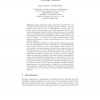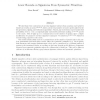209 search results - page 13 / 42 » Secure Hash-and-Sign Signatures Without the Random Oracle |
113
click to vote
ASIACRYPT
2009
Springer
15 years 9 months ago
2009
Springer
Adaptive oblivious transfer (adaptive OT) schemes have wide applications such as oblivious database searches, secure multiparty computation and etc. It is a two-party protocol whic...
165
click to vote
EUROCRYPT
2003
Springer
15 years 8 months ago
2003
Springer
Abstract. Digital Signatures emerge naturally from Public-Key Encryption based on trapdoor permutations, and the “duality” of the two primitives was noted as early as Diffie-He...
122
click to vote
PKC
2009
Springer
16 years 3 months ago
2009
Springer
We explore the security of blind signatures under aborts where the user or the signer may stop the interactive signature issue protocol prematurely. Several works on blind signatur...
112
click to vote
FOCS
2007
IEEE
15 years 9 months ago
2007
IEEE
We show that every construction of one-time signature schemes from a random oracle achieves black-box security at most 2(1+o(1))q , where q is the total number of oracle queries a...
133
click to vote
CRYPTO
2000
Springer
15 years 7 months ago
2000
Springer
Partially blind signature schemes are an extension of blind signature schemes that allow a signer to explicitly include necessary information (expiration date, collateral condition...


